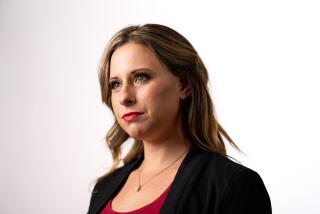DeLay Makes His Case to Have Charges Dropped
A judge heard arguments Tuesday over whether the money-laundering and conspiracy case against Rep. Tom DeLay (R-Texas) should be dismissed -- with the defense asserting that the charges were flawed and the prosecution arguing that the powerful lawmaker should be held accountable for circumventing election laws.
DeLay is charged with illegally funneling corporate campaign contributions to Republican candidates in Texas’ 2002 legislative races. He appeared in court with his wife but did not make any statements.
Judge Pat Priest said he would probably issue a ruling in two weeks. If the case goes to trial, it will probably not start before next year, he said.
Under House rules, DeLay had to relinquish his post as majority leader when he was indicted in September. If the case is thrown out or resolved in DeLay’s favor before Congress reconvenes in January, he could regain the position.
At issue is $190,000 in corporate donations given to an arm of the Republican National Committee by DeLay’s political action committee, Texas for a Republican Majority. Soon after, the Republican National Committee contributed the same amount to seven Texas candidates.
The direct use of corporate money in state campaigns is illegal in Texas.
Lawyers for DeLay and his codefendants -- Republican fundraisers John Colyandro and Jim Ellis -- said Tuesday that the Texas candidates had received money from a separate Republican National Committee account funded by private, not corporate, donors.
“The truth is, it was individually donated,” said Dick DeGuerin, DeLay’s lawyer.
The defense also argued that the conspiracy charges were based on a law not on the books until 2003, a year after the donations took place. In addition, they said, state money-laundering statutes at the time applied only to coin and paper money.
In DeLay’s case, “there will be no proof there was any cash money involved,” DeGuerin said.
But prosecutor Rick Reed said that state law had long defined conspiracy as an agreement to commit any felony and that the 2003 law was merely a clarification.
And Texas doesn’t claim that the money given to the legislative candidates was the exact money donated by corporations, Reed said. Rather, he said Tuesday, the transaction was illegal because the political action committee had solicited contributions from corporations by entering into a “negotiated swap”: Texas for a Republican Majority would donate money to the Republican National Committee with the understanding that the funds would eventually go to candidates supported by the group, Reed said.
Priest, a semi-retired judge from San Antonio, replaced the first judge assigned to the case, who was removed at DeLay’s request because of his contributions to Democratic candidates.
DeLay’s lawyers, saying he could not get a fair hearing in Austin, are seeking to move the trial to his more conservative home county of Fort Bend, southwest of Houston.
More to Read
Get the L.A. Times Politics newsletter
Deeply reported insights into legislation, politics and policy from Sacramento, Washington and beyond. In your inbox three times per week.
You may occasionally receive promotional content from the Los Angeles Times.






